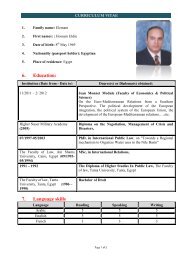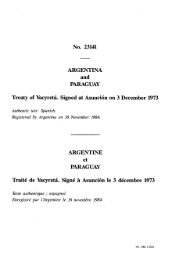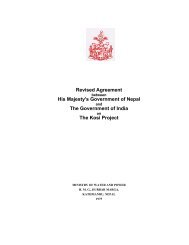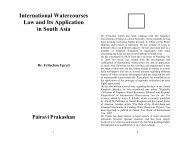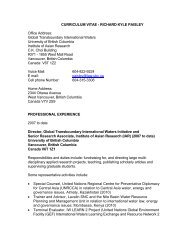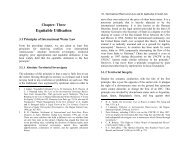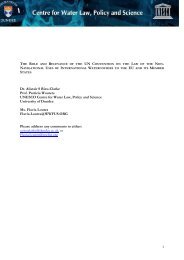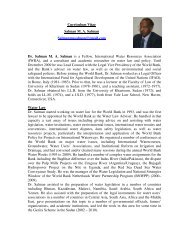Upreti, Trilochan, International Watercourses Law and Its Application ...
Upreti, Trilochan, International Watercourses Law and Its Application ...
Upreti, Trilochan, International Watercourses Law and Its Application ...
You also want an ePaper? Increase the reach of your titles
YUMPU automatically turns print PDFs into web optimized ePapers that Google loves.
Equitable Utilisation / 143 144 / <strong>International</strong> <strong>Watercourses</strong> <strong>Law</strong> <strong>and</strong> <strong>Its</strong> <strong>Application</strong> in South Asiaabsence of a law protecting the interests of developingcountries in the above situation, equity has played a vital role instrengthening their interests in international trade <strong>and</strong> business.3.7.2 Corrective Equity as Analysed to ContinentalShelf AllocationIn the equitable delimitation of the continental shelf underspecial geographical <strong>and</strong> hydrological circumstances, correctiveequity has been a milestone in ensuring fair justice <strong>and</strong> theprotection of the national interests. Initially, such disputes wereresolved by application of the conventional rule ofequidistance, under article 6(2) of the 1958 Geneva Conventionof the <strong>Law</strong> of the Continental Shelf. The application of this rulerequires states to render agreement applying the equidistanceformula. This rule, however, also contained an ‘escape clause’,allowing delimitation to depart from the equidistant line under'special circumstances’. This is an example of correctiveequity. 116 Such a formulation of equity was implemented in the1969 North Sea Continental Shelf Cases between Germany v.Denmark <strong>and</strong> the Netherl<strong>and</strong>s. 117 The court, in its decisionrejected the contention of the Danes <strong>and</strong> the Dutch, which werebased on the equidistance principle. The German contentionbased on a just <strong>and</strong> equitable share of the shelf was thatequidistance has no inherent link either to the nature of theshelf or to any principle of absolute proximity or adjacency,<strong>and</strong> was too sparse <strong>and</strong> inconclusive to merit a conclusion onthat principle alone. Corrective equity has since crystallizedinto a customary norm. The court in a similar vein wrote,“such delimitation must be affected by agreement inaccordance with the equitable principle … by takinginto account all the relevant circumstances...” 118116 Convention on Continental Shelf (1959) 15 UNTS, p. 471, 499 UNTS,p. 311.117 3 ICJ Reports (1969) pp. 47-53.118 Ibid.Considerations of equity form part of the underlyingmoral basis for rules of law. In this sense equity maybe regarded as a material source of law, but not as aformal source, nor in itself constituting a legal rule.Some circumstances relate to the nature of geology,the desirability of maintaining the unity of depositsof natural resources, <strong>and</strong> proportionality, (which isdefined as the attainment of a reasonable relationshipbetween the extent of a state’s continental shelf <strong>and</strong>the length of its coastline). 119 In another case decidedby an arbitration tribunal, the Anglo-FrenchContinental Shelf case, the Tribunal, in seeking tomaintain equity, held the view that in the particularcircumstances, departure from the equidistance rulewas essential in order to ensure equity. It stressedthat the proportionality principle should not govern,but merely correct the delimitation. 120 The Tribunalseemed to adopt a notion of fairness <strong>and</strong> yet stillcontain it within the guiding rule of equidistance. 121In the Fisheries Jurisdiction Case of 1974, (UK v. Icel<strong>and</strong>), adispute had arisen on account of Icel<strong>and</strong>’s unilateralprolongation of her fisheries zone to 50 nautical miles from thebase line. ICJ Reports, (1974) pp. 1-70. 122 The British Governmentsubmitted the case to the ICJ asking the court to adjudge <strong>and</strong>declare such action illegal <strong>and</strong> safeguard the UK’s rights offishing in that area. Icel<strong>and</strong> objected to the court's jurisdiction.In its decision, 123 the court declared that the Icel<strong>and</strong>icRegulation of 1972 constituting a unilateral extension of119 Ibid. pp. 50-52.120 Continental Shelf Case, (Arbitration Tribunal) 54 ILR, (1975) pp. 6-124.121 Supra note 69, pp. 578-580.122 ICJ Reports, (1974) pp. 1-70.123 Ibid.



